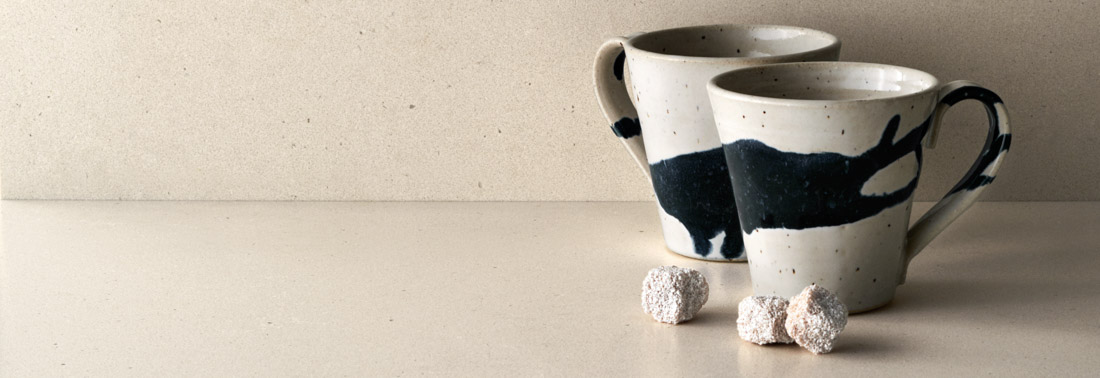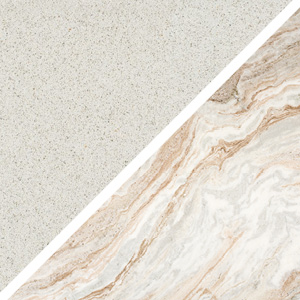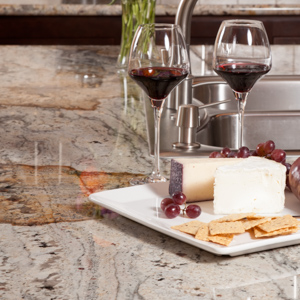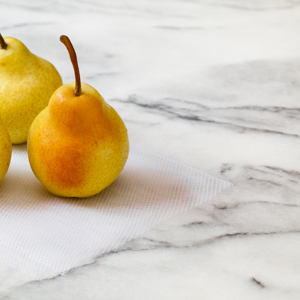
Caring for Your Quartz Kitchen Countertop
Quartz countertops are quickly becoming the high-end countertop of choice thanks to the variety of colors available, ease of maintenance, and durability. In many ways, quartz is very similar to granite—in fact, it’s an element in granite—but the engineering process, which binds the quartz with resin and various colored pigments, makes it non-porous and extremely durable.
Caesarstone, Silestone, Dekton (made by Silestone), and Cambria are just a handful of the most popular quartz manufacturers. These materials are available in slabs similarly to how you’d buy slabs of marble or granite.
Quartz is sometimes designed to resemble marble and granite, but is also available in a wide variety of colors and patterns, from creamy, smooth whites, to bold primary colors, to blacks that glean like onyx, to wild patterns like crocodile skin or other gemstones. Quartz also has a uniform pattern that allows for a virtually seamless look across even an expansive countertop.
With any of the top quality name brand quartz, cleaning and maintenance are a snap, and these countertops are fairly hard to damage—however, not impossible. Read on for tips on how to keep your new quartz kitchen countertop looking great.
Best practices for caring for your quartz countertop:
Use a soft cloth or sponge and hot water or mild cleanser
For most spills, hot water and a soft cloth is enough to clean your quartz countertop. Engineered quartz countertops are non-porous and resistant to chemicals, so you can use a mild cleaner when necessary. Avoid harsh cleaners like bleach. Like with granite, overuse of dish soap can leave a residue. It’s best practice to use a quality stone cleaning product made specifically for quartz.
Clean up spills quickly
Quartz won’t be etched by acidic substances like citrus juices, tomato sauce, wine, or coffee the way marble could be, and while it doesn’t need to be sealed, it can stain. Don’t stress about getting a little red wine on your white countertop, but be sure to clean up any spills right away.
Use cutting boards
Engineered stone won’t absorb bacteria from raw meat the way granite might and quartz is extremely hard, but it’s still a good idea to use a cutting board to protect both your countertop and your knives. Constant abuse could damage the countertop and cutting on stone is a good way to quickly dull the blades of your knives.
Don’t put hot pots or pans directly on the quartz
Again, quartz is heat resistant and in an emergency, you could put a hot pot on the countertop, but it could be damaged from extreme heat. To be on the safe side, it’s best to keep a supply of trivets and hot pads around to use when you take hot pots and pans off the stove.
Don’t sit or stand on a quartz countertop
Quartz, granite, and marble countertops are extremely hard, but they are not flexible. With the advent of modern kitchen design and the desire by homeowners for a clean, homogenous look in their kitchens, many stone countertops are now installed directly onto the cabinets (built with a hard top), without a layer of plywood. You could crack your countertop by sitting or standing on it, placing too much weight in one spot.
Some quartz finishes will require additional daily maintenance. For more information, consult the manufacturers’ care and maintenance guides. Click the links below.
http://www.caesarstoneus.com/customer-service/care-maintenance/




